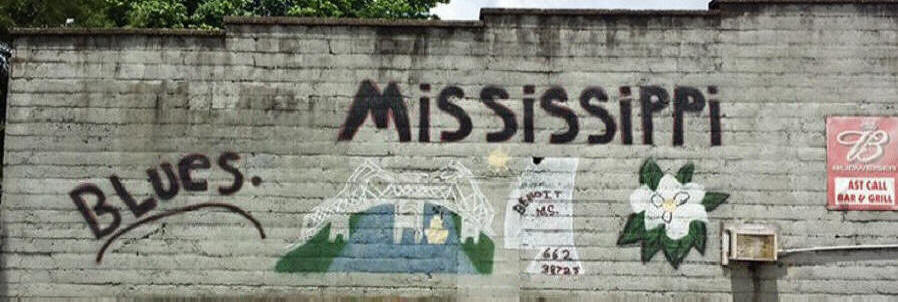
~ DELTA POETRY REVIEW ~
Returning to Bay St. Louis
We fly to the Gulf, pre-winter hummingbirds,
to sip nectar from long-stemmed glasses,
nibble on colossal Spanish olives, hummus,
pull words lodged from each other’s throats.
This is the place where we milk contentment,
numb from years on the road. The Great Flood
of 2005 smothered babies with heavy blankets.
It is peaceful now.
White light on a sea-blue marina,
yachts and skiffs and cabin-cruisers bobbing
in gentle surf, up and down from side to side,
memories of people whose bodies were jettisoned
into oblivion, past praying palms, up, up
into the serious atmosphere, the Giant Eye still
hours away, hidden behind dark gray walls
of boiling water, of sorrow that land-locked
people
will never understand, of dead fishes, chunks of
houses,
Honda Accords and Silverados, pieces of islands
and hearts;
rabbits and deer, legs of cell towers, buoys and
bars;
six-packs and big black Bibles. It is their seed.
With reverence and a filtered love, I flirt with
ghosts
that scan these beaches, their salt tears
cascading
onto white sand. A dot on a map, stuck in the
middle of green
and blue, no insurance to guarantee that another
avalanche
of violence will not reform. Such is life.
We check in at 420 Carroll Avenue, unloading our
concerns
for what happened on this street, paying homage to
people
who lived in this house. The living room table is
an anchor
for our fly-away feelings, our waterlogged
tongues, our loose limbs
that dance in blood breezes into the wee hours.
Wine glasses
in the galley, two bird nests wedged over the
front door.
Spirits protect us.
The Pool
Old men flock in locker rooms,
their tattoos stretched by gravity
beyond recognition,
a 1971 bleeding heart with an
arrow through the middle,
now a flattened marshmallow with
sticks protruding from its sides.
They move slowly these days, like
molasses, spreading out onto benches
with all of their stuff: straps
and bands, towels and tubes of Aspercreme,
trails of wet gray lint soughing
off of their shriveled legs as they trudge
into musty shower stalls.
Their wives walk the lazy river
beside the pool,
pushing against the current,
praying that Lipitor and eating
more beets and kale will do the
trick. “Purple means freedom,”
says the chatty lifeguard whose
voice echoes over water. It’s the way
she codes her notes, how she
manages her time she explains on her
blood-red iPhone.
There are babies being tossed into
the kiddie pool, unafraid to leave
their mothers’ waters for the
second time, kicking as naturally as guppies.
They need to acquire this skill
now to prevent them from drowning later.
There’s always a baby found in
some neighbor’s pool, usually around the
4th of July, when too many people
are more concerned about the potato salad
going bad.
The sign reads to shower before
you enter the pool, but I never do.
The lifeguards don’t pull rank; I
think they may have been tossed into pools
as babies, all of that control and
responsibility, the way they see dead people
bobbing in the water; that it
would certainly be their fault. I choose to clean myself
with a splash in Lane One,
lemon-yellow flippers attached to my feet, propelling me
half-way across the pool in eight
strokes. If someone tells me that I’m cheating,
I will remind them that it really
doesn’t matter since we are all living on borrowed time.
Whether John Dorroh taught any high school science is still being discussed. However, he managed to show up every morning at 6:45 with at least three lesson plans for a couple of decades. His poetry has appeared in Dime Show Review, Red Fez, North Dakota Quarterly, Red Dirt Forum, Tuck, Piker Press, Setu, Blue Moon Literary & Art Review, Suisun Valley Review, and several others. He also writes short fiction and the occasional rant.